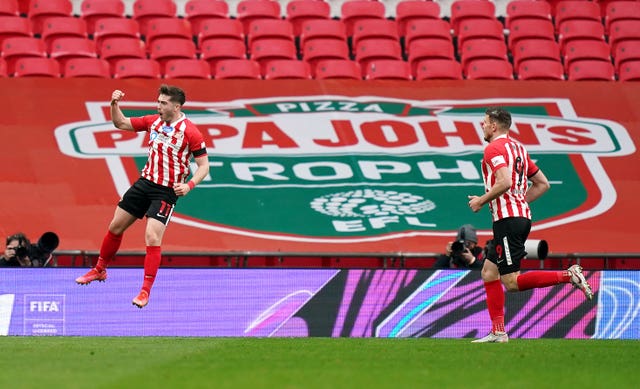Sunderland ended one dismal record at Wembley this season and history suggests both they and Brentford can do so again in the EFL play-offs.
The Black Cats won at Wembley for the first time since the 1973 FA Cup final when they beat Tranmere in March to lift the Papa John's Trophy.
They have come up short in every previous trip to the play-offs but are the second-ranked qualifiers in League One this season – and no position has produced more winners in the third tier.
Brentford, looking to reach the top flight for the first time since 1936, have never won a major final but also have the omens on their side as the Championship's leading qualifiers – as do Morecambe as they seek to progress beyond League Two for the first time.
Championship

Eleven teams have won promotion from the second tier as the top-ranked play-off qualifier in the 34 previous editions. That refers to the team immediately below the automatic promotion places, except in the first two seasons when a team from the division above was involved – in 1987, Charlton finished one place above relegation from the top flight and won the play-offs to stay up.
Bees fans will hope that offsets their club's record of losing four play-off finals and three in the Football League Trophy under its various guises, from the 1985 Associate Members' Cup all the way to last season's Championship play-off final against Fulham.
Semi-final opponents Bournemouth have the chance to join Norwich and Watford in winning an immediate promotion back to the Premier League, which would make it the first time ever all three relegated clubs have bounced straight back.
But they will have to do so from the fourth qualifying position, which in the second tier has produced only six play-off winners.
The other semi-final pits fourth-placed Swansea against fifth-placed Barnsley, with the equivalent positions having yielded nine and eight promotions respectively.
League One

Sunderland's woes began in the first ever play-off season when – having finished one place above automatic relegation in what was then the Second Division, now the Championship – they lost on away goals to a Tony Cascarino-inspired Gillingham side.
Swindon were promoted on that occasion and also beat Sunderland in 1990's Second Division play-off final after Gary Bennett's own goal.
There were defeats on penalties in the 1998 final at that level – following a hat-trick from Charlton striker and boyhood Sunderland fan Clive Mendonca in a 4-4 draw – and in 2004's semi-final against Crystal Palace, before Charlton again beat them in 2019's League One final with an injury-time goal from Patrick Bauer.
That was one of eight Wembley defeats since Sunderland's memorable 1973 win over Leeds, but Lynden Gooch's goal against Rovers ended that hoodoo and they will hope another now follows.
The second-ranked play-off team has won promotion on 11 occasions out of 34 in the third tier. That matches the figure for the leading qualifiers, with Blackpool occupying that spot this year.
The footballing truism of a team with momentum snatching the final place and winning promotion holds up to an extent at that level, with ninth fourth-ranked qualifiers doing so. That offers encouragement to Oxford, but Lincoln will have to buck the trend of only three third-ranked qualifiers being promoted.
League Two

Having never suffered a relegation along their slow and steady rise from the Lancashire Combination to the Football League, Morecambe earned a second ever crack at the fourth-tier play-offs this season after missing out on automatic promotion by one point.
As in their first Football League season, 2009-10, they go in as fourth-placed finishers and therefore top-ranked qualifiers – and though it did them no favours last time around, that position has produced 14 play-off winners in 34 years.
The omens are less encouraging for Newport in fifth, with only four second-ranked qualifiers winning promotion. Nine teams have done so from the third play-off spot, occupied this season by Forest Green, and seven from the final place where Morecambe's opponents Tranmere finished.







